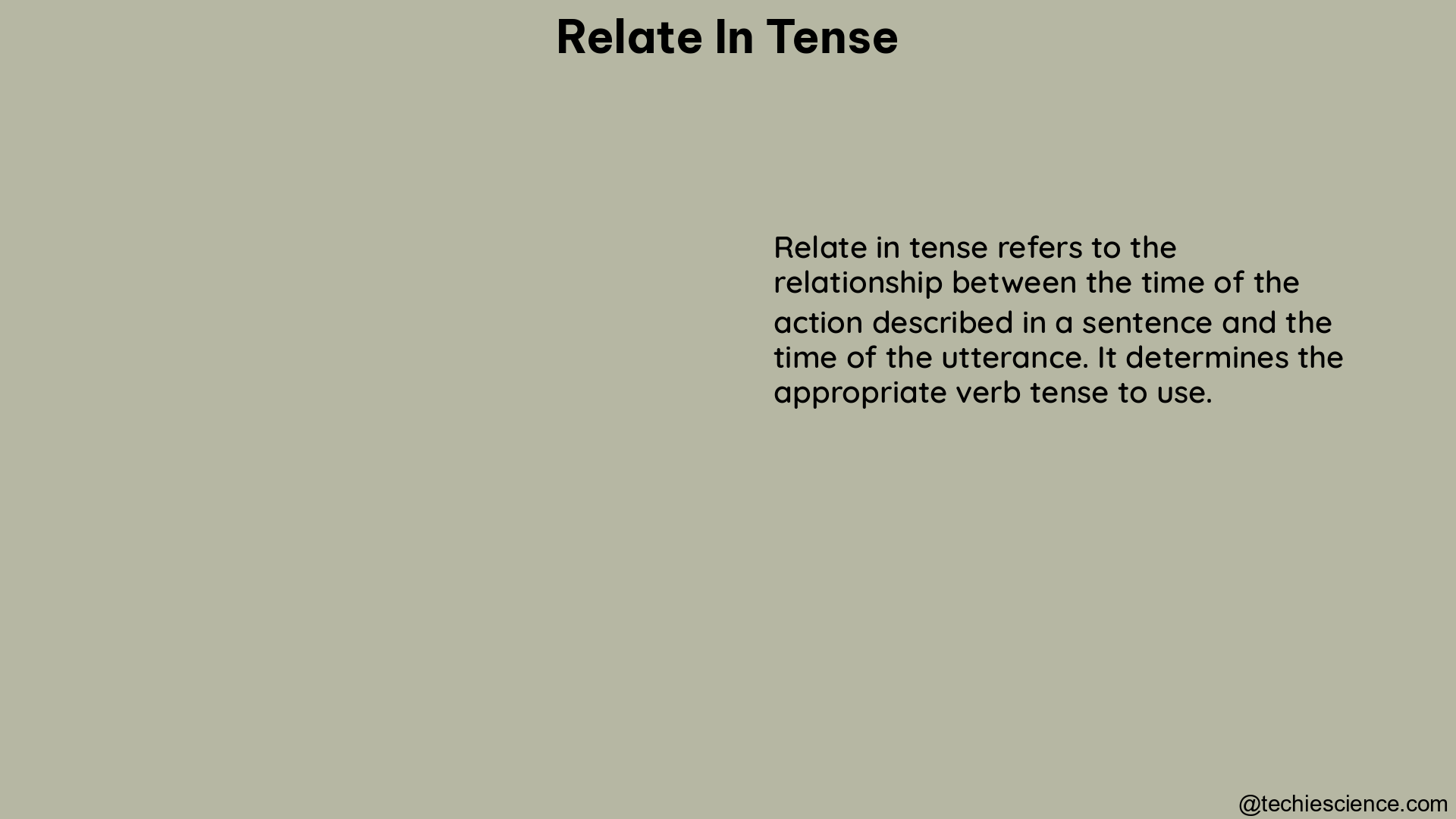The verb “relate” is a versatile and commonly used word in the English language, and understanding its conjugation across various tenses is crucial for effective communication. This comprehensive guide will delve into the intricate details of how to properly conjugate “relate” in different tenses, providing you with a thorough understanding of this essential verb.
Present Tense Conjugation of “Relate”
In the present tense, the conjugation of the verb “relate” follows a straightforward pattern:
| Person | Singular | Plural |
|---|---|---|
| First | I relate | We relate |
| Second | You relate | You relate |
| Third | He/She/It relates | They relate |
For example:
– I relate to the struggles of the protagonist in the novel.
– You relate to the character’s experiences.
– She relates the incident to the authorities.
– We relate to the message conveyed in the speech.
– They relate the story to their friends.
Past Tense Conjugation of “Relate”

The past tense of “relate” is formed by adding the suffix “-ed” to the base form of the verb:
| Person | Singular | Plural |
|---|---|---|
| First | I related | We related |
| Second | You related | You related |
| Third | He/She/It related | They related |
Examples:
– I related my experiences to the group.
– You related the events in chronological order.
– He related the details of the incident to the police.
– We related the story to our children.
– They related the information to the management team.
Past Participle of “Relate”
The past participle of “relate” is formed by adding the suffix “-ed” to the base form of the verb:
- related
This form is used in perfect tenses, such as the present perfect, past perfect, and future perfect.
Examples:
– I have related my concerns to the manager.
– She had related the incident to the authorities before the meeting.
– They will have related the details by the time the investigation is complete.
Present Participle of “Relate”
The present participle of “relate” is formed by adding the suffix “-ing” to the base form of the verb:
- relating
This form is used in continuous tenses, such as the present continuous, past continuous, and future continuous.
Examples:
– I am relating the events to the audience.
– They were relating the story to their grandchildren.
– You will be relating the information to the team.
Continuous Tense Conjugation of “Relate”
Present Continuous
| Person | Singular | Plural |
|---|---|---|
| First | I am relating | We are relating |
| Second | You are relating | You are relating |
| Third | He/She/It is relating | They are relating |
Past Continuous
| Person | Singular | Plural |
|---|---|---|
| First | I was relating | We were relating |
| Second | You were relating | You were relating |
| Third | He/She/It was relating | They were relating |
Future Continuous
| Person | Singular | Plural |
|---|---|---|
| First | I will be relating | We will be relating |
| Second | You will be relating | You will be relating |
| Third | He/She/It will be relating | They will be relating |
Examples:
– I am relating the events to my colleagues.
– You were relating the story to your family.
– She is relating the information to the management team.
– We will be relating the details to the authorities.
– They are relating the experiences to the group.
Perfect Tense Conjugation of “Relate”
Present Perfect
| Person | Singular | Plural |
|---|---|---|
| First | I have related | We have related |
| Second | You have related | You have related |
| Third | He/She/It has related | They have related |
Past Perfect
| Person | Singular | Plural |
|---|---|---|
| First | I had related | We had related |
| Second | You had related | You had related |
| Third | He/She/It had related | They had related |
Future Perfect
| Person | Singular | Plural |
|---|---|---|
| First | I will have related | We will have related |
| Second | You will have related | You will have related |
| Third | He/She/It will have related | They will have related |
Examples:
– I have related the details to the manager.
– You had related the incident to the authorities before the meeting.
– She has related the information to the team.
– We will have related the events by the time the report is due.
– They had related the story to their children before bedtime.
Perfect Continuous Tense Conjugation of “Relate”
Present Perfect Continuous
| Person | Singular | Plural |
|---|---|---|
| First | I have been relating | We have been relating |
| Second | You have been relating | You have been relating |
| Third | He/She/It has been relating | They have been relating |
Past Perfect Continuous
| Person | Singular | Plural |
|---|---|---|
| First | I had been relating | We had been relating |
| Second | You had been relating | You had been relating |
| Third | He/She/It had been relating | They had been relating |
Future Perfect Continuous
| Person | Singular | Plural |
|---|---|---|
| First | I will have been relating | We will have been relating |
| Second | You will have been relating | You will have been relating |
| Third | He/She/It will have been relating | They will have been relating |
Examples:
– I have been relating the events to the team for the past hour.
– You had been relating the details to the authorities before the investigation began.
– She has been relating the information to the management team for the past few days.
– We will have been relating the story to our children for a week by the time they leave for camp.
– They had been relating the experiences to the group for several sessions before the workshop ended.
Conclusion
Mastering the conjugation of the verb “relate” in English is essential for effective communication and understanding. This comprehensive guide has provided you with a detailed breakdown of how to properly conjugate “relate” in various tenses, including the present, past, perfect, and continuous forms. By familiarizing yourself with these conjugation patterns, you can confidently and accurately use the verb “relate” in your written and spoken English.
References
- WordReference.com. (n.d.). Conjugation of relate – WordReference.com. Retrieved from https://www.wordreference.com/conj/enverbs.aspx?v=relate
- Collins Dictionary. (n.d.). ‘relate’ conjugation table in English – Collins Dictionary. Retrieved from https://www.collinsdictionary.com/us/conjugation/english/relate
- Bab.la. (n.d.). How to conjugate “to relate” in English? – Bab.la. Retrieved from https://en.bab.la/conjugation/english/relate
- Reverso Conjugator English. (n.d.). Conjugate verb relate | Reverso Conjugator English. Retrieved from https://conjugator.reverso.net/conjugation-english-verb-relate.html
- Simple English Wiktionary. (n.d.). relates – Simple English Wiktionary. Retrieved from https://simple.wiktionary.org/wiki/relates

Hi…. This is Uttam Kumar Maji. I have completed my Master’s in English from Vidyasagar University. I have been teaching English Literature in Sabang Sajanikanta Mahavidyalaya since 2014. I am a creative writer. I am now part of the LambdaGeeks family.
Connect me via LinkedIn: